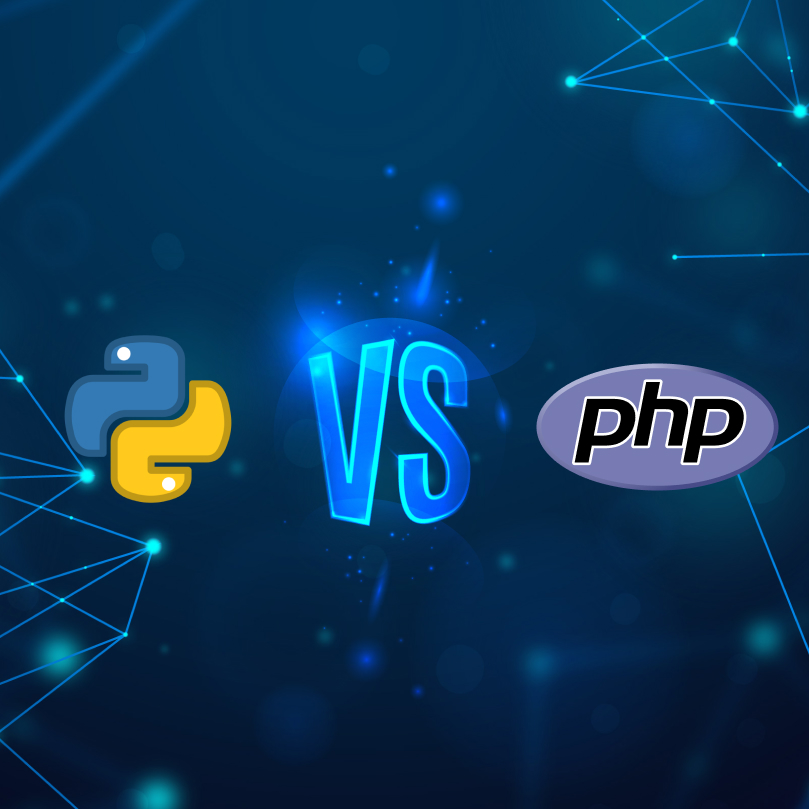Selecting the appropriate programming language is crucial in a website development project. Your choice of technology will significantly influence the final outcomes. Python and PHP are two prominent programming languages among businesses engaging in web development projects.
Determining which language to adopt presents a formidable challenge for business organizations since both of them offer unique pros and cons. Consequently, understanding the apt programming language for your project becomes imperative.
Python or PHP? In this blog, we will extensively compare these two programming languages and ascertain which one aligns better with the requirements of your project. Let’s learn more about these two programming languages before uncovering their differences.
An Insight into Python
Python is an object-oriented programming language. Its inherent data structures and dynamic typing and binding capabilities contribute to its suitability for swift website development. Additionally, Python provides assistance for modules and packages, facilitating system modularity and code reusability.
Python stands out as one of the fastest programming languages, enabling web developers to achieve more with fewer lines of code. Its focus on readability and simplicity enhances its appeal, particularly for individuals starting their programming journey.
Here are several reasons to consider choosing Python:
- Python code is known for its simplicity and ease of debugging. This makes it easier to maintain compared to code in other languages.
- Python offers an interactive shell that allows you to test and experiment before implementing your code.
- Python simplifies complex programming tasks by handling memory addresses and garbage collection internally.
An Insight into PHP
PHP (Hypertext Preprocessor) is an extensively used server-side programming language for website development. When assessing its performance in recent times, it is noteworthy that it has undergone notable enhancements and additions that have made it more efficient, scalable, and secure. These improvements have contributed to its favorable reputation.
Furthermore, PHP is frequently utilized with various other web technologies, including databases like MySQL and PostgreSQL, front-end frameworks like Vue.js and React, and content management systems like WordPress and Drupal.
PHP is thus a popular choice for web development ventures, especially those necessitating dynamic content generation and server-side processing.
There are several compelling reasons to utilize PHP:
- PHP is an open-source language. This enables anyone to download and employ it for their web development project. It also allows developers to inspect the code, report errors, and resolve bugs.
- PHP offers cross-platform compatibility. This enables you to use this programming language on various operating systems and devices.
- Thanks to its flexibility, PHP can easily integrate with JavaScript, XML, and HTML.
Let’s check out the differences between PHP and Python.
An In-Depth Comparison Between PHP and Python
Python vs. PHP: Speed to Market
Today, businesses are constantly seeking ways to accelerate their journey of digital transformation. It is crucial to promptly develop a minimum viable product (MVP) in order to secure funding for further advancements in product development. This necessity underscores the importance of selecting the right programming language for your website.
Python offers an impressive array of third-party libraries, modules, and packages that facilitate faster project completion. One prominent example is Django, a widely recognized framework for web development. Python employs the model-view-controller (MVC) pattern, allowing New York-based web development companies to build websites swiftly.
Similarly, PHP comes with its own set of tools, including libraries and frameworks. Laravel, the most popular framework within the PHP community, also embraces the MVC pattern. It comes pre-packed with numerous features that allow web developers to quickly complete projects.
Python vs. PHP: Ease of Learning
One of the best things about Python is that it is easier to learn. Also, you can easily select a programming course for beginners. Python programs are not only shorter but can also be written easily when compared to other programming languages.
Let’s come to PHP now. It isn’t a general-purpose language at all. It is mostly utilized to create sophisticated web apps. Therefore, learning this programming language may take longer than Python.
Therefore, Python emerges as the clear winner when it comes to ease of learning.
Python vs. PHP: Security
When it comes to website development, ensuring security is crucial. Here are some reasons why:
Rapidly-evolving field: Web development constantly evolves, with new technologies and frameworks emerging. Developers often struggle to keep up with the evolving security threats and take the necessary steps to mitigate them.
Functionality vs. security: In the pursuit of functionality, security can sometimes take a backseat. This can lead to the unintentional inclusion of security vulnerabilities in web applications, which attackers can exploit.
Human errors: Mistakes happen, and in web development, failing to sanitize user input properly can result in serious security vulnerabilities. These vulnerabilities may provide an entry point for attackers to exploit the website.
Increased cost and time: As you progress through the development lifecycle, fixing security vulnerabilities becomes more expensive and time-consuming. It is far more efficient and cost-effective to address security concerns early on.
In terms of security, Python is often recommended for businesses. For example, the Django framework offers built-in security features that help protect websites from various security threats.
On the other hand, PHP has had a troubled history with security. Although many security issues have been addressed with the support of a strong community, PHP still falls short compared to Python in terms of security.
It is essential for businesses to prioritize security during web development to protect sensitive data.
Python vs. PHP: Website Speed and Performance
Website speed plays a big role in determining the overall performance and user experience. In today’s fast-paced era, speed is of utmost importance.
Python is known for its speed and power. Python’s Just-In-Time (JIT) compiler contributes to its faster performance than its competitor, PHP. A big advantage of the JIT compiler is that once you assemble the files, you no longer need to recompile them.
The earlier versions of PHP were considerably slower compared to Python. With the release of PHP 8.2, there was a significant turnaround in enhancing the speed of websites. Considering website speed is essential for ensuring optimal performance and user satisfaction.
Is PHP faster than Python? Well, both of them have made improvements in this aspect, with Python’s JIT compiler and PHP’s advancements in PHP 8.2. These have resulted in faster and more efficient websites.
Python vs. PHP: Environment Management
Effective environment management is vital in website development. It provides a controlled and stable development environment that supports each phase of the website’s lifecycle. This approach enhances collaboration, accelerates development and testing, minimizes downtime, and boosts security. Therefore, it ensures high-quality websites.
While virtPHP was an environment manager for PHP, it has been archived for a long time. Currently, containers such as Docker and Kubernetes are better alternatives for web developers to run a microservice or extensive application.
A container offers several advantages to users. It includes reduced overheads and improved efficiency, making it a suitable environment management option for PHP.
When it comes to environment management for Python, Virtualenv is a highly efficient and valuable option. It allows developers to install and manage multiple Python versions simultaneously and switch versions swiftly. Virtualenv is widely popular among developers and has been in the market for ten or more years.
In conclusion, environment management is absolutely vital in website creation as it enables website development companies in NYC to build websites efficiently, ensuring high performance, security, and stability. Both Python and PHP offer reliable environment management tools to help developers achieve this goal successfully.
The Verdict
Python or PHP? Which is better for web development? Both Python may outperform PHP in some areas, but that does not necessarily mean that it is the better choice for all projects. Both languages have their unique features and advantages that developers can leverage when building websites.
Ultimately, the choice between PHP and Python depends on your project needs and your level of expertise in each language. It’s essential to consider factors such as the project’s complexity, the team’s skills, and familiarity with the language, among other variables.
Choosing the right programming language is crucial as it impacts how easily you can develop, deploy, and maintain your website. You can also work with a web development company in New York City in case you are unsure about which programming to use for your project. It can also be beneficial if you lack the technical expertise.


